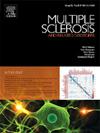探讨幽默作为中度残疾的多发性硬化症患者应对抑郁情绪和病情恶化恐惧的因素:对康复队列的横断面分析。
IF 2.9
3区 医学
Q2 CLINICAL NEUROLOGY
引用次数: 0
摘要
背景:多发性硬化症患者(pwMS)终生都面临着与疾病相关的压力,常常导致抑郁情绪和对病情恶化的恐惧(FoP)。幽默感明显的人对压力表现出更强的适应力,并倾向于将威胁视为挑战。本研究调查了幽默是否可被确定为抑郁情绪和恐惧进展方面的一个相关应对因素:参与者为 77 名德国住院病人,年龄在 25-64 岁之间,主要患有复发缓解型多发性硬化症。对幽默技能(幽默感量表,SHS)、抑郁情绪(流行病学研究中心抑郁量表,CES-D)和对疾病进展的恐惧(疾病进展恐惧问卷,FoP-Q)之间的关系进行了顺时针回归分析,并对人口统计学变量、疾病特异性变量和自我管理变量进行了调整。我们还进行了相关分析和调节分析,以评估幽默风格(漫画风格标记,CSM)和自我观察(作为自我暗示措施,资源和自我管理技能评估问卷)对这些关系的影响:结果发现,SHS 总分是抑郁情绪较轻(CES-D,RΔ = 0.05,p = .005)、FoP 较低(FoP-Q 总分,RΔ = 0.06,p = .004)和焦虑应对能力较强(FoP-Q 焦虑应对能力,RΔ = 0.06,p = .007)的重要独特决定因素。只有浅色幽默风格与特定的 FoP-Q 量表相关;深色幽默风格变量与任何研究变量都不相关。自我观察分量表未能在 SHS 和情绪障碍之间起到调节作用:数据表明,心理疾病患者的幽默技能与抑郁和FoP的减少有关,这就需要将适应性幽默作为一种应对资源纳入心理疾病患者的社会干预中。不过,还需要通过更大规模的纵向试验来进一步验证。本文章由计算机程序翻译,如有差异,请以英文原文为准。
Exploring humor as a coping factor against depressive mood and fear of progression in people with multiple sclerosis with moderate disability: A cross-sectional analysis of a rehabilitation cohort
Background
People with multiple sclerosis (pwMS) face disease-related stress throughout their lives, often resulting in depressive mood and fear of progression (FoP). People with a pronounced sense of humor demonstrate greater resilience to stress and tend to perceive threats as challenges. This research investigates whether humor can be identified as a relevant coping factor in pwMS regarding depressive mood and FoP.
Methods
Participants were 77 German inpatients aged 25–64 years with predominantly relapsing-remitting MS. Blockwise regression analyses were conducted to examine the relationship between humor skills (Sense of Humor Scale, SHS), depressive mood (Centre for Epidemiologic Studies Depression Scale, CES-D), and fear of progression (Fear of Progression-Questionnaire, FoP-Q), adjusting for demographic, disease-specific, and self-management variables. Correlational and moderator analyses were conducted to evaluate the impact of humor styles (Comic Style Markers, CSM) and self-observation (as a self-distancing measure, Questionnaire to Assess Resources and Self-Management Skills) on these relationships.
Results
The summed SHS score was found to be a significant unique determinant for less depressive mood (CES-D, RΔ = 0.05, p = .005), low FoP (FoP-Q sum score, RΔ = 0.06, p = .004), and greater anxiety coping (FoP-Q anxiety coping, RΔ = 0.06, p = .007). Only light humor style was associated with specific FoP-Q scales; the variable dark humor style was not correlated with any study variable. The subscale self-observation failed to moderate between SHS and emotional disorders.
Conclusion
Data indicate that humor skills in pwMS are associated with less depression and FoP, which argues for incorporating adaptive humor as a coping resource into psychosocial interventions for pwMS. However, further validation is needed through larger and longitudinal trials.
求助全文
通过发布文献求助,成功后即可免费获取论文全文。
去求助
来源期刊

Multiple sclerosis and related disorders
CLINICAL NEUROLOGY-
CiteScore
5.80
自引率
20.00%
发文量
814
审稿时长
66 days
期刊介绍:
Multiple Sclerosis is an area of ever expanding research and escalating publications. Multiple Sclerosis and Related Disorders is a wide ranging international journal supported by key researchers from all neuroscience domains that focus on MS and associated disease of the central nervous system. The primary aim of this new journal is the rapid publication of high quality original research in the field. Important secondary aims will be timely updates and editorials on important scientific and clinical care advances, controversies in the field, and invited opinion articles from current thought leaders on topical issues. One section of the journal will focus on teaching, written to enhance the practice of community and academic neurologists involved in the care of MS patients. Summaries of key articles written for a lay audience will be provided as an on-line resource.
A team of four chief editors is supported by leading section editors who will commission and appraise original and review articles concerning: clinical neurology, neuroimaging, neuropathology, neuroepidemiology, therapeutics, genetics / transcriptomics, experimental models, neuroimmunology, biomarkers, neuropsychology, neurorehabilitation, measurement scales, teaching, neuroethics and lay communication.
 求助内容:
求助内容: 应助结果提醒方式:
应助结果提醒方式:


